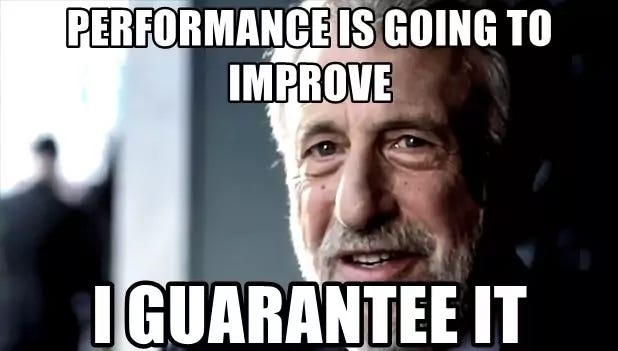Why Performance Ranking Doesn't Math.
The math of stack-ranking shows the true purpose of stack-ranking; Abusing people into appearing busier.
The final question my boss, sorry, I mean the person who “supports me” (inverted pyramid cult language correction), asked me in my interview series was, “What makes you professionally angry at work? What makes you lose your temper? “
My answer was “Abuse of positional authority.” he must’ve liked it because the silly man hired me.
I pushed back hard when I was first informed; literally, on my first day, we’d be abusing employees in our “inverted pyramid” fashion retail enterprise with stack ranking.
The bonus system at this retail enterprise was a significant percentage of compensation (20-60% of annual comp), so the potential harm being done with a capricious, abusive, stack ranking performance management system was significant.
Lies supporting this effort
There’s no forced curve.
The goal is to improve performance.
Employees want this.
So, I told my boss on my first day that I had severe misgivings about this stack-ranking situation. He asked me what they were.
Without clear measures of outcomes and strategy, any measurement attempt will be highly biased and subjective at best.
Research has shown that performance management and management by objective (mbo) don’t improve performance and have many deleterious effects.
My boss asked me to send him any data I had.
I contacted one of my favorite people, Esther Derby, who sent me two excellent papers <link> and <link>. Feel free to read them. To my amazement, given the propensity of executives to not read, I believe my boss read the papers.
”Those papers were quite compelling and made some solid points. I still feel I can tell who my top performers are versus my steady Eddies.”
Well, how can I argue with that? The evidence against it is compelling, but someone with positional authority feels they can do better.
Anyway, onto the math.
Lie # 1: There’s no forced curve.
Every org is given a bonus allocation based on company performance.
Within that org, we must choose losers and winners. We’re not permitted to “peanut butter” and share the bonus pool equally among labor because we need to reward the “top performers,” of course, if we’re going to reward the top, somebody has to pay for it. Somebody other than the oligarchs who inherited the company from their parents. They can keep buying dozens of classic cars and private jets; there’s just no additional money to reward labor who are the source of their wealth.
Our HR lizard got mad at me when I asked why we have to pick losers, and she kept saying “budgetary limitations,” which made no sense, but do not try to reason with an HR lizard. You’ll just get back-channeled and “feedbacked” by your boss, who supports you, right, I mean, the person who supports you will back-channel and “feedback” you. You know, for supportive reasons.
Anyway, insisting that we must choose people to lose their bonuses to fund the “top performers” is, by definition, forcing a curve.
Also, what if everyone in Supply Chain tech outperforms everyone in the digital organization? That means some “poor performers” in the Digital org will get outsized bonuses but higher performers in the Supply Chain get punished. Totally fair and just.
Lie #2: The goal is to improve performance.
I attended many trainings to learn how to “fairly” administer this inherently unfair. abusive system, and I spoke up at most of them in one way or another.
At one training, I had a good rapport with the HR rep (not a lizard) who was running the training so she kept asking me to participate and give my feedback.
I resisted because I didn’t want to make her feel bad, but I could only abide so much of it, and she kept asking.
When I did express myself, she’d be shocked, and a room full of taciturn leaders would give a “hear hear” or mutters and nods.
At the end of the training, she said, “Look, everyone, I know we’re not all loving this, but this is about improving performance.”
I failed to stay quiet at that point.
”So let’s pull that apart. Let’s ignore all the research about money not being an effective motivator of performance and pretend that people will perform better if they get a prize or if part of their compensation is held ransom.
If I have a team of 10 people, and 1 of them performs above and beyond such that I want to reward them with an outsized bonus, but the rest of the team also all performed well, none of them below expectations, I am required under this system, to arbitrarily choose one of the people who performed well to punish.
Leaving aside how abusive that is, the fact of the matter is that there’s a disincentive to collaboration because if that top performer helps the person who was punished, they do so at their peril. If that person performs better as a result of the help, the bonus to pay them may have to come from the person who helped them improve.
Secondly, if the goal is to increase performance, and the money increases performance, then we’re not even mathematically correct here because you’re saying our budget for performance bonuses is fixed. So the company is saying, in essence
1. Allocating capital to individuals is how we increase performance.
2. We will not fund any net increase in performance.
This means the company is only willing to fund a fixed level of performance.
At this point, I thought she’d explain or engage, but she was so mad (especially given how many others nodded in agreement) that she ended the training on the spot.
“I am not going to debate this program with you. Everyone is free to leave.”
She resigned months later. She’s a good person. She doesn’t belong in enterprise retail technology HR.
3. Employees want this
This policy was wildly unpopular with every leader and most employees I spoke to. During the aforementioned training, we were supposed to do a mock performance review wherein one person would play the person being shat upon, I mean reviewed, and the other person would do the….. reviewing.
The example review was awful. Subjective, vague, and abusive.
She said, “Now, we’ve had some problems with this exercise. It’s gotten quite heated. We’ve had some people playing the reviewee part storm out of the room in a profane rage. We solved this problem by instituting a new rule wherein the person being reviewed does not speak.”
There were low snickers.
I was seated next to a director I’d never met, and when we were told to begin, we decided not to do the activity.
”I left Microsoft because of this shit,” he said
”I came here partly because I was promised I’d never have to do this to people here because of an inverted pyramid and healthy leadership culture.”
We had a lovely conversation while we didn’t do the exercise to each other.
There were a couple of young sociopaths who said they were glad of the system, but none of them framed their pleasure at the fact some good people would get more. They all framed it as being delighted the “bad, lazy people” would get less.
This is not an instinct I want to support or foster. Having every employee glancing sideways at each other, wondering who’s working the hardest, does not seem like a way to produce meaningfully impactful retail supply chain software solutions.
Ultimately, I strongly suspect the real reason for this is that the unapologetic author of Microsoft’s globally maligned, abusive, ineffective, ‘rank and yank’ policy was now a member of the board of directors for this retail enterprise.
One final note about bias
A conscientious leader approached me and was very unhappy with this ranking system.
”I have cultural divides in my organization. I have entire groups of people who are culturally uncomfortable with interactions with me because of my authority. When I have no clear measures of performance, and given we have no coherent strategy with which to gauge outcomes of said performance, how am I going to remove my own bias to give a bonus to someone I enjoy socially vs. someone uncomfortable with my presence? Am I going to overcorrect and give more bonuses to the people I don’t interact easily with? It’s just an impossible problem to be handed.”
What could be done instead?
One of my closest friends found himself briefly in a VP position and had a bonus to allocate to his org.
He asked the teams how they wanted to distribute the pool.
Did they want to allocated evenly and based on percentage of annual salary? Did they want to just give the same lump sum across the team.
Ultimately they chose first to allocate some funds to a few employees who were unfairly undercompensated. (At the fashion retail oligarchy this was expressly forbidden) and with the rest they decided to split it evently half as a percentage, and half as a flat amount.
What matters the most here is the employees decided what was fair.
We need to take back our power as labor and stop allowing all these powerful executives to run amok with all this nonsense.




